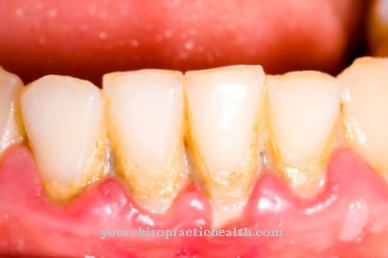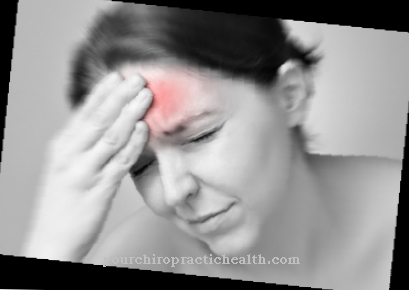Balance disorders relate to the sense of balance. This is necessary to ensure posture and orientation. Balance disorders belong to the category of disorders of consciousness.
What are balance disorders?

© designua - stock.adobe.com
The organ of equilibrium is located in the inner ear. Its medical term is: Vertibulum. It is also closely linked to the center of balance in the cerebellum. However, other human organs or senses are also responsible for the sense of balance. Hearing, eyes, skin and muscles are only mentioned as examples.
General signs of impaired balance are usually characterized by dizziness, blurred vision, and nausea. In extreme situations, a balance disorder can even lead to unconsciousness.
causes
As a rule, imbalances have harmless causes. An example of this is seasickness, with strong waves or after turning around your own axis quickly or after getting out of bed too quickly.
However, imbalance can also be a symptom of illness. For example, with low blood pressure, high blood pressure, concussion, sunstroke, meningitis and fungal poisoning.
You can find your medication here
➔ Medicines for balance disorders and dizzinessDiseases with this symptom
- Mushroom poisoning
- concussion
- Meningitis
- migraine
- Sunstroke
- multiple sclerosis
- dementia
- Transient ischemic attack
- Creutzfeldt-Jakob disease
- Burnout syndrome
- Meniere's disease
- stroke
Complications
Most of the complications associated with imbalance are falls. The consequences are often broken bones, bruises, abrasions of the skin or lacerations. The most common cause of imbalance is alcohol abuse, here the patient has to give up drinking, otherwise complications will arise again and again. If a brain tumor has been found, imbalance disorders are not uncommon. The tumor must of course be removed, usually an operation is pending.
However, if the tumor is discovered in good time, the symptoms can still be combated with medication or radiation, but here the patient suffers from balance disorders all the time. A drug can alleviate the worst symptoms somewhat, but only when the tumor disappears are the imbalances cured.
The sense of balance sits in the ear and complications often arise in the treatment of otitis media. This allows bacteria to penetrate the inner ear and cause hearing loss or tinnitus. The eardrum can also scar and sometimes bony adhesions form on the inner ear. The result is irreparable hearing impairment. If an otitis media is left untreated, it can spread and affect what is known as the mastoid. If the mucous membrane here is inflamed, doctors diagnose mastoiditis. This complication can also be recognized externally, with painful swelling and reddening of the skin behind the ear. In the worst case, meningitis develops from it or the facial nerves are paralyzed.
When should you go to the doctor?
A balance disorder has its origin in the inner ear. This is where the vestibule is located, an organ of equilibrium closely connected to the cerebellum. In addition, the eyes and hearing support the sense of balance and, in addition, the sensitive tactile sensations of the skin and the muscles responsible for compensatory movements.
A balance disorder manifests itself as a feeling of dizziness, nausea and visual disturbances. It can help to just wait and sit or lie down. Overexertion, circulatory disorders and sunstroke are common triggers of a balance disorder. You don't always need medical treatment. Likewise, seasickness can often be mastered with peace and quiet and tablets obtained in advance, or the ship's doctor on board takes care of the passenger.
However, there are some serious illnesses for which the imbalance is a symptom. These include, for example:
- high blood pressure
- concussion
- Meningitis
- multiple sclerosis
- Meniere's disease
- Burnout
- dementia
The benign paroxysmal positional vertigo is also notorious for imbalance: the small crystals in the vestibule of the inner ear move, which gives the balance organ the impression of movement and a feeling of dizziness. This is where the ear, nose and throat specialist is called for. In the case of other causal diseases for a balance disorder, the ENT doctor works together with the other specialists required, such as internists or neurologists.
Doctors & therapists in your area
Treatment & Therapy
First of all, it should be clarified what is the underlying cause of a balance disorder. It must be clarified how often and since when imbalance disorders occur and whether these appear at rest or in motion. Furthermore, it must be checked whether drugs are also considered as a cause.
During a medical examination, reflexes, mobility and feelings are checked. The doctor usually conducts coordination tests, such as the Romber standing test, to assess the sense of balance.
Further examinations, depending on the cause, can be carried out with the help of hearing tests, blood tests, electroencephalography (EEG), magnetic resonance imaging (MRI), electromyography (EMG), computed tomography (CT) and liquor puncture (cerebral fluid test).
If the imbalance disorders are hamrless in nature, such as on boat trips or bus trips, antivertigenosis, i.e. agents against dizziness, as well as agents against nausea (antiemetics) can help preventively and soothingly.
Balance disorders caused by strokes and similar causes may need to be treated surgically.
Outlook & forecast
If the imbalance occurs only briefly, no treatment by the doctor is necessary. This is especially the case if the imbalance occurs while traveling by bus, boat, train or plane. In these cases, the imbalance is accompanied by nausea and vomiting and is a common symptom for many people. Medicines for travel sickness can be taken here to reduce the imbalance. However, this disappears again when the journey is over.
If the imbalance occurs after a stroke, it usually has to be treated with an operation.
A balance disorder also occurs with the consumption of alcohol and other drugs and is just as harmless in this case. It then disappears again when the respective substance has been broken down in the body. Stress and burnout can also create the imbalance. Here, treatment by a psychologist is advisable, which in most cases leads to a positive course of the disease.
It is not uncommon for patients to complain of a balance disorder after a concussion. Complications can arise here as the cause of the disorder is unknown. If there is bleeding in the brain or other traumatic damage, an immediate surgical intervention is necessary. In most cases, an imbalance is harmless if it only occurs temporarily.
You can find your medication here
➔ Medicines for balance disorders and dizzinessYou can do that yourself
In most cases, an imbalance can be treated relatively well. If the imbalance occurs mainly when traveling, medication can be taken to prevent dizziness. At the same time, these calm the nervous system and thus also ensure a pleasant and relaxed journey. These remedies are also used to treat nausea and vomiting. The balance disorder occurs to different degrees in different people when traveling. In order to avoid nausea and vomiting in general, little should be eaten when traveling.
In many cases, going to physiotherapy or starting a sporting activity helps. In general, a healthy lifestyle helps counterbalance disorders. This includes eating a healthy diet and engaging in physical activity. If the imbalance occurs after a severe accident or after a stroke, there is usually no possibility of self-help. A surgical procedure must be carried out here, which is carried out by a doctor.
If the imbalance is relatively severe, the patient should sit down and rest. Often, increased fluid intake has a positive effect on the imbalance. If the imbalance occurs after consuming alcohol or other drugs, withdrawal must take place. As a rule, the symptom disappears on its own if no more alcohol is consumed.













.jpg)

.jpg)
.jpg)











.jpg)